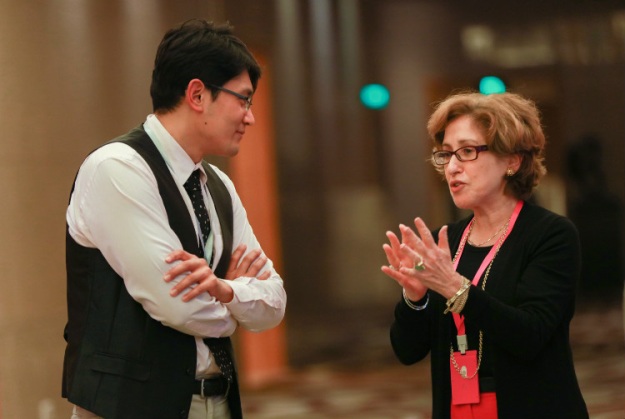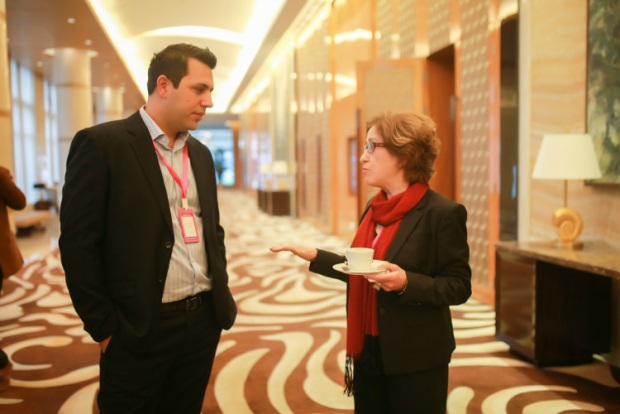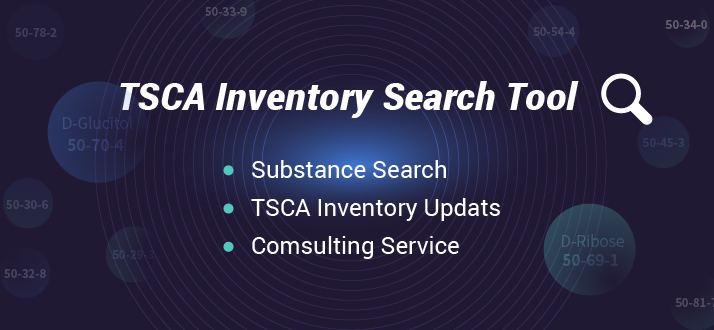Themed “Key to the Door” –Global Cosmetics Regulatory Affairs Conference 2015 Held in Hangzhou China
Celebrating the success of the REACH24H annual conferences in the past six years, REACH24H Consulting Group brought us 3 grand conferences targeting at the food, chemicals and cosmetics industries, respectively. The Cosmetics Division gathered resources and organized a 3-day Global Cosmetics Regulatory Affairs Conference from November 18th to 20th 2015 at the Double Tree by Hilton Hotel, Hangzhou China.
The central theme of the conference is to help find the “key to the door”. In today’s growing and diverse cosmetics international business environment, the major hurdle for successful introduction of cosmetics products lies in the differences of regulatory requirements between the country of origin and the intended overseas markets.
What would be the key recommendations for Chinese cosmetics manufactures interested in the international markets? What would be the practical tips for overseas cosmetics companies to explore Mainland Chinese market? How would these countries change their approach in cosmetics regulations? And how should cosmetics companies cope in the event of it? These are the key questions to entertain in the Global Cosmetics Regulatory Affairs Conference 2015.
The highly anticipated event featured honorable cosmetics regulatory experts all across the globe to share their experiences, to learn from one another and to debate the future development in the regulatory regimes. Their talks were tailored to explicitly present results directly applicable to solving these problems.
The conference kicked off with a half-day pre-conference as an introduction to this new and growing professional network. The official conference was structured with presentations to allow all participants enter active discussions. It engaged many dozens of representatives from major multinational and domestic cosmetics and ingredients companies, for instance, Shanghai Jahwa, AMOREPACIFIC and Infinitus.
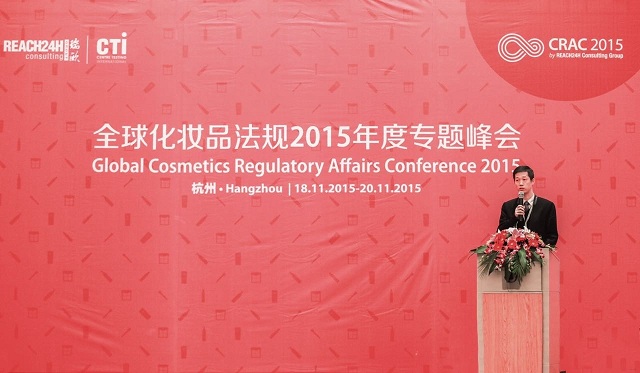

Asia-Pacific
Mainland China – Latest Development of Cosmetics Regulatory Regime
Mr. Liu Yang from China Association of Fragrance Flavor and Cosmetic Industries (CAFFCI) gave an overview to the Chinese cosmetics regulatory framework. He clearly pointed out that a considerable amount of efforts have been put into revising many of the important current regulations and standards by the CFDA in 2015, which led to growing public concerns.
According to Mr. Liu, 2015 is definitely the year of significance. The overarching “Cosmetics Supervision and Management”, enacted since 1989 by the Ministry of Health, underwent two major draft amendments in the last couple of years. The principle regulation and its guidance for implementation no longer cover all the aspects of the Chinese cosmetics markets, for instance, the recent emerging of Cross Border E-commerce and those newly-formulated imported cosmetics. Furthermore, in the same year, the CFDA carried out gradual revision and solicited public opinions on the “Cosmetics Technical Hygiene Standards”, “Guidance to Cosmetics Manufacture Licensing” and “Ingredients Existing Chemicals in Cosmetics”.
Taiwan and Hong Kong
Ms. Emily Lin from Cosmetics and Cleansing Products Committee, Importers and Exporters Association of Taipei shared with us the local classification of cosmetics and the differences in the registration procedures. According to Mr. Lin, the classification of products in Taiwan shared a lot of common grounds with that of Mainland China. Only medicated cosmetics products need to obtain pre-market approval. Post-market surveillance is primarily carried out on a voluntary basis through online notifications.
Hong Kong, as a recognized world harbor city and a special administrative region of People’s Republic of China, demonstrates an exceptionally higher level of freedom in trades compared to most of other areas in the world. As Mr. Albert K.P. Leung Hong Kong Cosmetic Technical Resources Center revealed, there are no mandatory requirements for pre-market approval, license or testing. The Hong Kong government recommends obtaining the license of manufacture, however, this license is not a pre-requisite. Moreover, no specific rules have been laid down in regards to labeling of cosmetics. The only post-market surveillance measure is inspections carried out by the Hong Kong customs and the Consumer Council.
The conclusion is, as it might be shocking to many, it is entirely possible, common and legal for a non-license owner to launch a cosmetics product without any logo, name, country of origin or list of ingredients. In the midst of it all, frauds are not allowed and will be subject to penalties.


Mr. Liu Yang Ms. Lin

Mr. Leung
South Korea, Japan and ASEAN
Mr. Tiger Kim from Cosmetic Consulting specified the distinctive labeling requirements in South Korea for cosmetics products of different volumes. Mrs. Aoi Kondo, from Nishimura Q&R Office Inc. listed in total 56 kinds of permitted cosmetics functional claims including moisturizing hair and suppling skin. However, anti-aging and skin lifting are not among those permitted claims in Japan. The substances are
Dr. Michael Turville, the former President of Chamber of Philippines Cosmetic Industry, noted that the ASEAN which consists 10 member countries, its population mounts 600 millions, which makes ASEAN the third largest market after the United States and Europe. Launching cosmetics products in ASEAN market requires filing notification to the competent authorities in each member countries. Dr. Michael Turville addressed that it is of primary importance to manufacture in compliance to GMP and ACD Close collaboration of competent authorities, strengthening market surveillance and the reporting of undesirable effect also play an important role in better protecting consumer interests.


Mr. Tiger Kim Ms. Aoi Kondo
EU, Israel, the United States and Canada
On the 2nd day of the summit, Ms. Caroline Cardoso from Product Life pointed out that cosmetics product safety in European Union focus heavily based on safe raw materials. Currently the materials of major concerns are CMR1 and 2, nanomaterials and endocrine disruptors.
Ms. Liu from European Union Chamber of Commerce in China shared with us the Sino-EU cosmetics business review. She pointed out that more than 5 billion personal care items are sold in the European Union each year, which means every European use at least 5 personal care product on a daily basis.
EU enforced a thorough prohibition on carrying out animal experiments to demonstrate cosmetics products safety. In contrast to the labelling restriction approach adopted by many countries and areas, the European Union did not establish a permitted/prohibited functional claims list like what Japan has. Claims need to be substantiated based on the six guidelines which are are legal compliance, truthfulness, evidence support, honesty, fairness, allowing making informed choice.
MOROCCANOIL Israel Ltd. Company registration manager Idan Yehiel Avishay regulations stated that Israel is revising many aspects of their cosmetics regulation including safety assessment, responsible person, notification and other registration procedures based on the EU Cosmetics Regulation 1223/2009. He noted that at the time being, the revision has got to the last stage before completion.
Ms. Sharon Blinkoff from Independent Cosmetic Manufactures and Distributors (ICMAD) used interesting case-studies to demonstrate the distinctive flexibility given by the cosmetics regulations in the U.S.
Connie Kehler from Canadian Herbs, Spices and Specialty Agriculture Association, Connie pointed out that in Canada, information on the cosmetics label must be given both in English and in French.


Ms. Caroline Cardoso Mr. Idan Yehiel Avishay

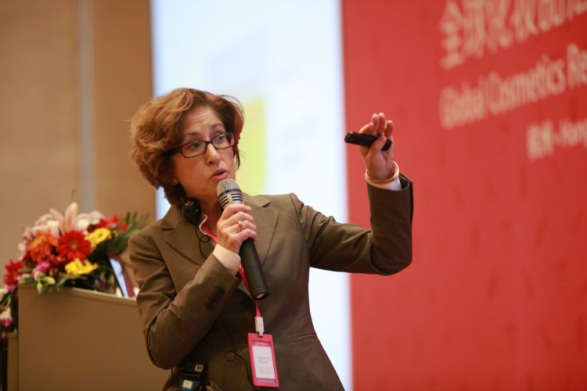
Ms. Coco Liu Ms. Sharon A. Blinkoff
Cross-Border E-commerce
Mr. Xuan explained in details regarding the difference between online Shopping Bonded and General Trade Import.

Mr. Xuan
The country’s first cross-border trade e-commerce industry park
After 2-full-day in-depth lectures and discussions, our Speakers and guests visited the Hangzhou E-commerce Cross-border Comprehensive Pilot Zone of According to the staff, the import and export business turnover will reach $ 1 billion RMB in 2015. We went on a tour together with guests to understand its operation, which achieved exceptional learning outcomes.



Our Moments




